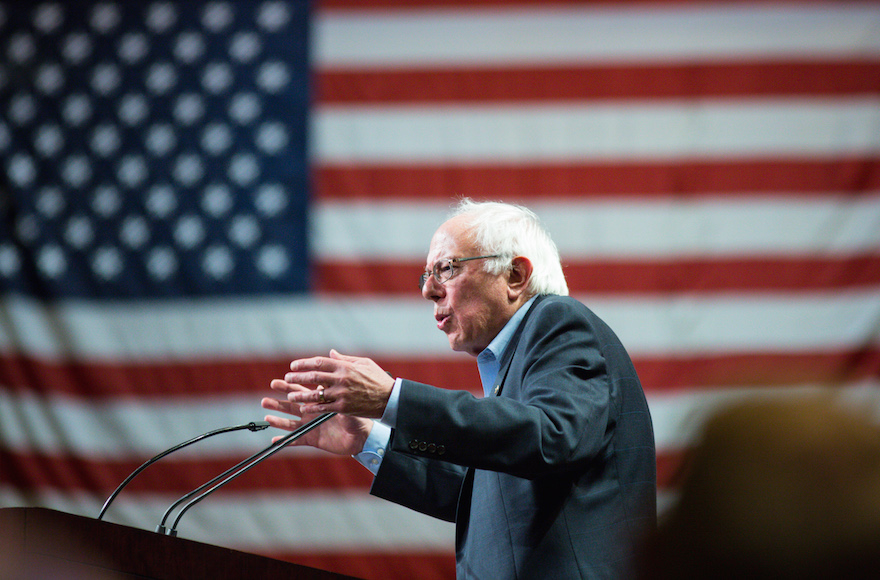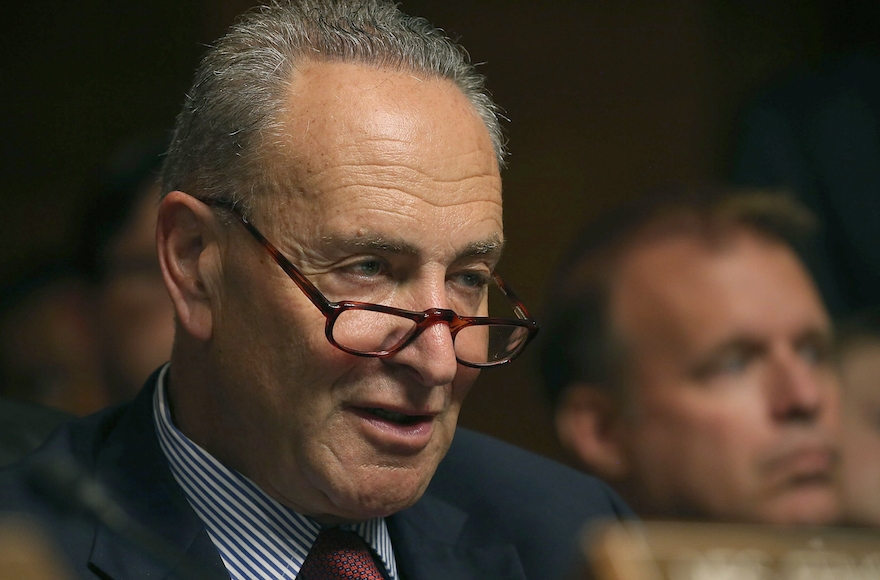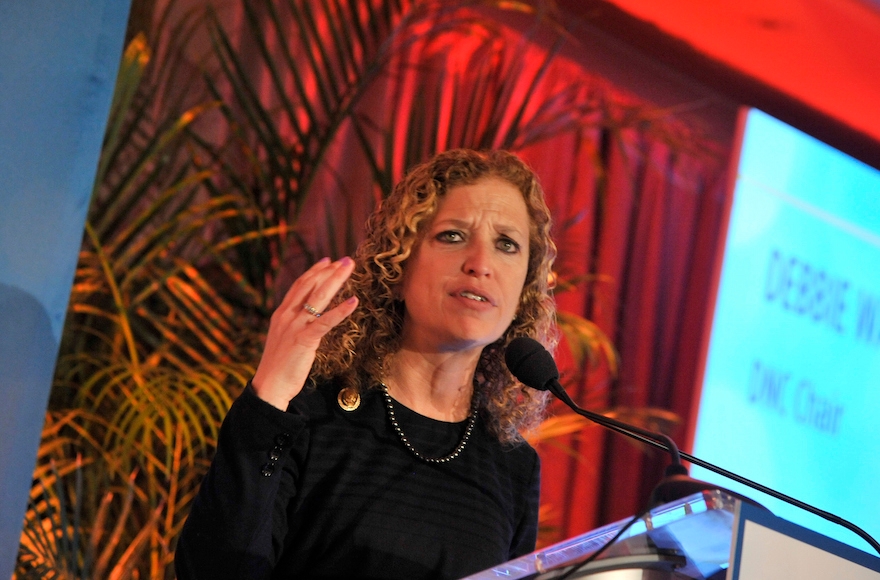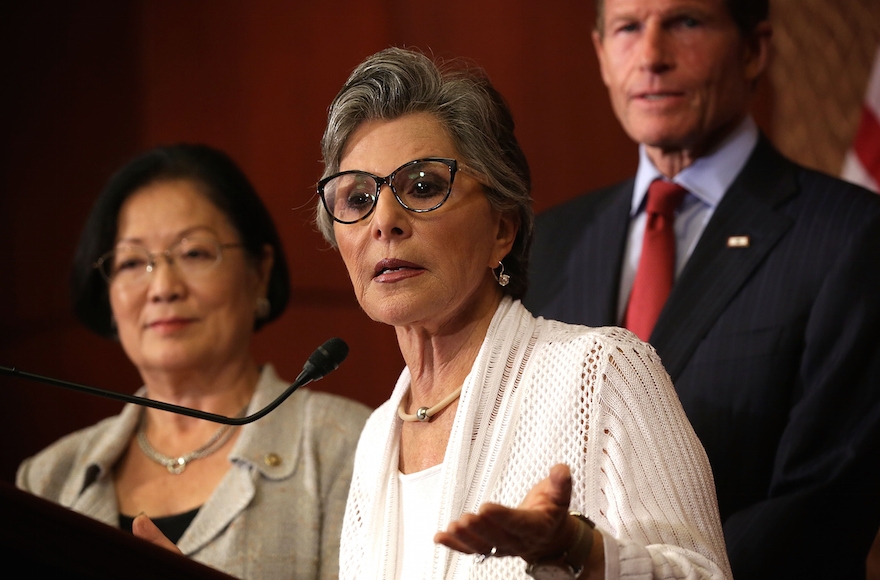LAST UPDATED: Sept. 8, 2015
There are 28 Jewish members of Congress: 26 Democrats, one independent who caucuses with the Democrats and one Republican. Nine of them are senators and 19 are representatives.
The positions of Jewish lawmakers are being watched as Congress decides whether to vote to approve or disapprove of the July 14 agreement between Iran and world powers.
The vote, to be held by Sept. 17, is expected to be for disapproval — though supporters of the deal now believe they have enough votes, 41, to block a vote in the Senate.
President Barack Obama has promised to veto a resolution of disapproval and backers of the deal have mustered more than enough votes to keep opponents of the deal from garnering the two-thirds majorities in both houses of Congress to override him.
Counting Jewish lawmakers, as distinct from their colleagues, can be controversial. Some ask, why not just track overall whip counts? Are you counting African-American lawmakers? The answers are, respectively: Overall whip counts are being covered closely, and yes, blacks, too.
But doesn’t singling out Jews feed into Jewish loyalty and cabal stereotypes?
The answer to this one: Yes, it unfortunately does. But it should be done anyway.
Bigotry and the fear of it cannot dictate news coverage. Identity politics is a fact of American life. There is a Congressional Black Caucus, a Congressional Hispanic Caucus and a Congressional Asian Pacific American Caucus. Each of these caucuses has a figurative “lobby us” shingle on its door.
No single member of Congress can expect to be immersed in every issue coming before the world’s most powerful and influential legislature. Lawmakers naturally look to colleagues who are closest to an issue for guidance.
What’s up on immigration? Few lawmakers — few Democrats at least — would pronounce without first taking the temperature of the Congressional Hispanic Caucus. Police-black relations? Check in with the Congressional Black Caucus. Israel? There’s the congressional Jewish caucus.
Except there isn’t. Or there is, kind of. Jewish lawmakers meet, they consult, their staffs check in with one another. Every four years, the American Israel Public Affairs Committee assembles a “Breakfast with Mishpocha” at political conventions.
But there is no official caucus. It is said that Jewish lawmakers will never formally organize precisely because of anxieties over the anti-Semitic stereotypes cited here: dual loyalties and cabals.
And yet their non-caucus functions just like the other caucuses — as the front door of Congress for interests representing issues that tend to preoccupy Jews more than other Americans. So when AIPAC needs a Senate sponsor for an enhanced ally bill, it makes sense to sign on Sen. Barbara Boxer, D-Calif., in no small part because she is Jewish. And when Boxer scolded Israeli Prime Minister Benjamin Netanyahu for seeming to interfere in the last U.S. presidential election, she drew headlines, in no small part because she is Jewish.
When political scientists John Mearsheimer and Stephen Walt’s “ferkakte” theory about the pro-Israel lobby pushing the Iraq war started to gain traction in 2007, an arrow through its heart was a letter signed by 16 Jewish lawmakers saying that no, AIPAC had never lobbied them to support the war. It was understood that AIPAC lobbies Jewish lawmakers first; so if AIPAC had not lobbied Jewish lawmakers on the Iraq War, it had lobbied no one on the Iraq War.
In 2015, AIPAC is very much in the lead lobbying against the Iran deal, and its focus has been on Jewish lawmakers.
Dozens of members of Congress have come out against the Iran deal, yet AIPAC issued a statement thanking only one, Sen. Charles Schumer, D-N.Y. Schumer is of course key partly because he is a leading Democrat, and with Republicans more or less unified against the deal, the battleground for the deal is Democrats.
But Schumer is also key because he is Jewish, and because, playing on his last name, he has called himself a “shomer [‘guardian’] for Israel.” It goes both ways: J Street, in listing lawmakers who agree with its support for the deal, identified two lawmakers as Jewish: Reps. Sander Levin, D-Mich., and Adam Schiff, D-Calif.
The Obama administration has focused with intensity equal to AIPAC’s on Jewish lawmakers, with Obama meeting in special sessions with the caucus.
“This is a decision that weighs heavily on all members of Congress — particularly on Jewish members,” Rep. Jerrold Nadler, D-N.Y., wrote on Aug. 5 in a JTA Op-Ed about the Iran deal. Rep. Alan Grayson, D-Fla., signs off on his statement announcing support for the deal with a Yiddish proverb: “A shlekhter sholem iz beser vi a guter krig. (A bad peace is better than a good war.)”
One day in a perfect world, or at least a perfect United States, an ambitious intern at the Congressional Jewish Caucus Leadership Institute will compile a whip list like this, and reporters will merely link to it. Until then, JTA is doing the work.

Sen. Bernie Sanders of Vermont speaking at the Phoenix Convention Center, July 18, 2015. The Democratic presidential is backing the Iran deal. (Charlie Leight/Getty Images)
Backing the deal
Senate
Sen. Richard Blumenthal, D-Conn., elected 2010. Ranking Democrat on the Senate Committee on Veterans’ Affairs. Statement: “My two paramount goals have been to prevent a nuclear-armed Iran and do so by peaceful means. I believe the proposed agreement, using diplomacy, not military force, is the best path now available to prevent a nuclear-armed Iran. While this is not the agreement I would have accepted at the negotiating table, it is better than no deal at all. And it can be made even better through unilateral American action and collaboration with our European allies.” (Sept. 8)
Sen. Barbara Boxer, D-Calif., elected 1992, retiring next year. Democratic chief deputy whip, member of the Senate Foreign Relations Committee. Statement: “The bottom line is that Iran is a bad actor and a nuclear-armed Iran would make the world a much more dangerous place – and that is why Congress should unite behind this deal to block Iran’s path to a bomb.” (Aug. 4)
Sen. Dianne Feinstein, D-Calif., elected 1992. Ranking Democrat on the Senate Intelligence Committee. From her congressional website’s foreign policy page: “Senator Feinstein strongly believes that the only way to peacefully resolve the international community’s dispute with Iran over its nuclear program is through diplomacy. She supports the nuclear agreement between the P5 +1 (the United States, the United Kingdom, France, Germany, China and Russia) and Iran.”
Sen. Al Franken, D-Minn., elected 2008. CNN Op-Ed: “Many have expressed reservations about the deal, and I share some of those reservations. It isn’t a perfect agreement. But it is a strong one. This agreement is, in my opinion, the most effective, realistic way to prevent Iran from getting a nuclear weapon anytime in the next 15 years.” (Aug. 13)
Sen. Bernie Sanders, I-Vt., elected 2006. Caucuses with Democrats, running for president. From the CBS’s “Face the Nation”: “It’s so easy to be critical of an agreement which is not perfect. But the United States has to negotiate with, you know, other countries. We have to negotiate with Iran. And the alternative of not reaching an agreement, you know what it is? It’s war. Do we really want another war, a war with Iran? An asymmetrical warfare that will take place all over this world, threatening American troops. So I think we go as far as we possibly can in trying to give peace a chance, if you like. Trying to see if this agreement will work. And I will support it.” (Aug. 7)
Sen. Brian Schatz, D-Hawaii, appointed 2012, elected 2014. Statement: “This agreement should not be compared to an imaginary deal where Iran rolled over, and eliminated all its centrifuges and all peaceful nuclear energy generation. That was never seriously on the table. It should be compared to its real world alternative — an unraveling of the international sanctions, Iran moving ever faster towards the bomb, and our country left with few choices other than another war in the Middle East.” (Aug. 10)
Sen. Ron Wyden, D-Ore., elected 1996. Ranking member of the Senate Finance Committee, member of the Intelligence Committee. Statement on Medium: “This agreement with the duplicitous and untrustworthy Iranian regime falls short of what I had envisioned, however I have decided the alternatives are even more dangerous.” (Sept. 8)
House
Rep. David Cicilline, D-R.I., elected 2010. Member of the House Foreign Affairs Committee. Statement: “After months of serious deliberation and careful consideration, I have come to the conclusion that the United States and the world will be safer with the JCPOA than without. A nuclear Iran is a threat to the United States, Israel and the world and must absolutely be prevented. The JCPOA forces Iran to relinquish its nuclear weapons ambitions and reaffirms, by its own language, that ‘under no circumstances will Iran ever seek, develop, or acquire any nuclear weapons.'” (Sept. 8)
Rep. Steve Cohen, D-Tenn., elected 2006. Statement: “Through my intense study of this agreement, I am convinced that it is the most effective way to ensure Iran cannot build a nuclear weapon.” (Aug. 19)
Rep. Susan Davis, D-Calif., elected 2000. Op-Ed in the San Diego Union-Tribune: “I opposed invading Iraq because I was convinced we had not exhausted all diplomatic options and questioned our lack of planning for the aftermath. As another difficult decision approaches, I am convinced that after an extensive number of discussions and reviewing materials, the Iran nuclear agreement creates a viable path to reducing Iran’s nuclear weapons capability now and for the future.” (Aug. 27)
Rep. Alan Grayson, D-Fla., elected 2008, unseated 2010, reelected 2012. Member of the House Foreign Affairs Committee, running for Senate. Blog post: “I wish that these negotiations had been used as a vehicle to bring peace to the region. But it’s too late for that now. The immediate question is a simple one: Is it more dangerous to have an agreement, or to have no agreement? On the evidence I see, it’s more dangerous to have no agreement. So I will be voting in favor of the Iran nuclear agreement … A shlekhter sholem iz beser vi a guter krig. (A bad peace is better than a good war.) – Yiddish Proverb.” (Sept. 9)
Rep. Sander Levin, D-Mich., elected 1982. Ranking Democrat on the House Ways and Means Committee, longest serving Jewish member of Congress. Statement: “I along with my brother and late sister when we were in our teens experienced with our parents great personal joy when President Truman announced U.S. recognition of Israel. It was something that we could take hold of amidst the unfolding horrors of the years before. Israel’s security has and always will be of critical importance to me and our country. I believe that Israel, the region, and the world are far more secure if Iran does not move toward possession of a nuclear weapon. I believe the Agreement is the best way to achieve that.” (July 28)
Rep. Alan Lowenthal, D-Calif., elected 2012. Member of the House Foreign Affairs Committee. Statement: ״I have never studied an issue in such depth, and I have never been lobbied as hard. I believe that this is the most important vote that I will take while I am in Congress. I have decided to support the JCPOA agreement because I believe it is the best chance we have at preventing a nuclear-armed Iran. I believe that this agreement is in the best security interests of my constituents, our nation, for Israel, and the world.” (Aug. 26)
Rep. Jerrold Nadler, D-N.Y., elected 1992. Op-Ed for JTA: “After carefully studying the agreement and the arguments and analyses from all sides, I have concluded that, of all the alternatives, approval of the JCPOA, for all its flaws, gives us the best chance of stopping Iran from developing a nuclear weapon. Accordingly, I will support the agreement and vote against a Resolution of Disapproval.” (Aug. 21)
Rep. Jared Polis, D-Colo., elected 2008. Statement: “Congress must consider this deal in the context of the available alternatives. Even if the United States does not participate, the international community very likely will, and Iran will still receive access to billions of dollars in accounts currently frozen under international sanctions. Not only would this diminish our influence internationally; it would substantially limit our ability to hold Iran to the rigid standard of disarmament set forth in the agreement. On the other hand, if we fully participate, we can play a leading role in the deal’s implementation and enforcement and provide ourselves a direct line of access to Iranian facilities. This course of action ensures an influential role for the United States in future developments in the Middle East and, I believe, ensures the greatest likelihood that Iran will not obtain a nuclear weapon.” (Sept. 4)
Rep. Jan Schakowsky, D-Ill., elected 1998. Democratic deputy chief whip. Statement: “This agreement will not solve every problem – and I stand with the President in his pledge to do even more to protect Israel’s security and combat ISIS. But this deal will prevent Iran from posing the most serious problem – a nuclear threat. Now that our negotiators have succeeded, I stand ready to make sure this agreement moves forward.” (July 14)
Rep. Adam Schiff, D-Calif., elected 2000. Ranking Democrat on the House Intelligence Committee. Statement: “The Iranian people will one day throw off the shackles of their repressive regime, and I hope that this deal will empower those who wish to reform Iranian governance and behavior. The fifteen years or more this agreement provides will give us the time to test that proposition, without Iran developing the bomb and without the necessity of protracted military action. Then, as now, if Iran is determined to go nuclear, there is only one way to stop it and that is by the use of force. But then at least, the American people and others around the world will recognize that we did everything possible to avoid war.” (Aug. 3)
Rep. Debbie Wasserman Schultz, D-Fla., elected 2004. Chairwoman of the Democratic National Committee, member of the foreign operations subcommittee of the House Appropriations Committee. Initiated in her freshman term legislation that created Jewish Heritage Month. Op-Ed in the Miami Herald: “This is the most difficult decision I have had to make in the nearly 23 years I have served in elected office, and this vote will be the most consequential. It’s also one that is deeply personal. Iran’s leaders routinely call for the destruction of the United States, the nation to which I have dedicated my life to serving. Iran’s leaders are also virulent anti-Semites and call for the destruction of Israel, the historic homeland for me and millions of other Jews. Many people, whose opinions I respect immensely, have told me they believe this decision is a ‘no brainer’ and that I should have long ago decided to vote for or against the agreement. This agreement is many things, but a ‘no brainer’ is not one of them … This agreement is not perfect. But I join many in the belief that with complex, multilateral, nuclear non-proliferation negotiations with inherent geopolitical implications for the entire world, there is no such thing as a ‘perfect’ deal.” (Sept. 6)
Rep. John Yarmuth, D-Ky., elected 2006. Statement: “This historic agreement is a victory for American diplomacy and international security. We now have a clear plan to prevent Iran from developing a nuclear weapon, which ensures a safer world and a more stable Middle East. As President Obama stated this morning, this agreement is not built on trust — it is built on verification.” (July 14)

Sen. Charles Schumer participating in a Senate Judiciary Committee hearing on Capitol Hill, July 8, 2015. The New York Democrat, a leader in his party, came out against the Iran nuclear deal. (Mark Wilson/Getty Images)
Opposing the deal
Senate
Sen. Ben Cardin, D-Md., elected 2006. Ranking Democrat on the Senate Foreign Relations Committee. With the committee’s chairman, Sen. Bob Corker, R-Tenn., crafted legislation that gave Congress 60 days to consider whether to reject the deal. Op-Ed in Washington Post: “The JCPOA legitimizes Iran’s nuclear program. After 10 to 15 years, it would leave Iran with the option to produce enough enriched fuel for a nuclear weapon in a short time. The JCPOA would provide this legal path to a country that remains a rogue state and has violated its international nonproliferation obligations for years. It would provide Iran with international endorsement of an industrial-scale nuclear program. Worse, Iran would be economically strengthened by frighteningly quick relief from sanctions and international economic engagement. If Iran violates the agreement, building international support for new sanctions would take too long to be effective. A military response in this scenario would be more likely, although disastrous.” (Sept. 4)
Sen. Charles Schumer, D-N.Y., elected 1998. A leading contender for Democratic leadership in the Senate when Sen. Harry Reid of Nevada, the minority leader, retires next year. Statement: “Ultimately, in my view, whether one supports or opposes the resolution of disapproval depends on how one thinks Iran will behave under this agreement. If one thinks Iran will moderate, that contact with the West and a decrease in economic and political isolation will soften Iran’s hardline positions, one should approve the agreement. After all, a moderate Iran is less likely to exploit holes in the inspection and sanctions regime, is less likely to seek to become a threshold nuclear power after ten years, and is more likely to use its newfound resources for domestic growth, not international adventurism. But if one feels that Iranian leaders will not moderate and their unstated but very real goal is to get relief from the onerous sanctions, while still retaining their nuclear ambitions and their ability to increase belligerent activities in the Middle East and elsewhere, then one should conclude that it would be better not to approve this agreement.” (Aug. 6)
House
Rep. Ted Deutch, D-Fla., elected 2010. Ranking Democrat on the Middle East subcommittee of the House Foreign Affairs Committee. Op-Ed in the South Florida Sun-Sentinel: “There are different predictions about what will happen if Congress rejects this deal. But the consequences of approving it aren’t up for debate. Opening Iran up to foreign investment, increasing its oil exports, and unfreezing over $100 billion in assets means more money for Hamas for building terror tunnels in Gaza, more weapons for Hezbollah in Lebanon, more slaughter in Syria, and more violence worldwide. After a decade in public life working to stop Iran from ever acquiring nuclear weapons, I cannot support a deal giving Iran billions of dollars in sanctions relief – in return for letting it maintain an advanced nuclear program and the infrastructure of a threshold nuclear state.” (Aug. 4)
Rep. Eliot Engel, D-N.Y., elected 1988. Ranking Democrat on the House Foreign Affairs Committee. Statement: “At the outset, I was troubled that Iran was not asked to stop enriching despite the fact that there were several separate UN Security Council resolutions compelling them to do so. I have raised questions and concerns throughout the negotiating phase and review period. The answers I’ve received simply don’t convince me that this deal will keep a nuclear weapon out of Iran’s hands, and may in fact strengthen Iran’s position as a destabilizing and destructive influence across the Middle East.” (Aug. 6)
Rep. Lois Frankel, D-Fla., elected 2012. Member of the House Foreign Affairs Committee. Statement: “I do not support the current deal because it legitimizes Iran’s nuclear program after 15 years and gives Iran access to billions of dollars without a commitment to cease its terrorist activity. It’s too high a price to pay.” (Sept. 8)
Rep. Steve Israel, D-N.Y., elected 2000. Until last year, chaired the Democratic Congressional Campaign Committee. Interview with Newsday: “I tried very hard to get to ‘yes.’ But at the end of the day, despite some positive elements in the deal, the totality compelled me to oppose it.” (Aug. 4)
Rep. Nita Lowey, D-N.Y., elected 1988. Ranking Democrat on the House Appropriations Committee. Statement: “This agreement will leave the international community with limited options in 15 years to prevent nuclear breakout in Iran, which will be an internationally-recognized nuclear threshold state, capable of producing highly enriched uranium. I am greatly concerned that the agreement lacks a crystal clear statement that the international community reserves the right to take all military, economic, and diplomatic measures necessary during the course of the deal and beyond to deter Iran from ever developing a nuclear weapon.” (Aug. 4)
Rep. Brad Sherman, D-Calif., elected 1996. Ranking Democrat on terrorism and nonproliferation subcommittee of the House Foreign Affairs Committee. Statement: “This Agreement is the Good, the Bad and the Ugly. It contains the good and the bad in the first year, and gets ugly in the years thereafter. The Good: Iran gives up 97% of its stockpile of enriched uranium and decommissions 2/3 of its existing centrifuges. The Bad: Iran gets access to at least $56 billion of its own currently-frozen funds, and free access to the international oil markets. The Ugly: In 15 years or less, Iran is permitted to have an unlimited quantity of centrifuges of unlimited quality, as well as heavy water reactors and reprocessing facilities. I might be willing to accept the good with the bad during the first year of the Agreement. But we must force modifications of the Agreement, and extensions of its nuclear restrictions, before it gets ugly.” (Aug. 7)
Rep. Lee Zeldin, R-N.Y., elected 2014. The only Jewish Republican in Congress, member of the House Foreign Affairs Committee. Op-Ed in the Washington Times: “The irony of the president’s capitulation is that this bad deal will pave the path to more instability in the Middle East, not less. The Iranians were at the table desperate for sanctions relief. They were not there as freedom-loving, good citizens of the world. The Iranians were not at the table because they fear the military option. The leverage was sanctions relief. That brought the Iranians to the table, which is proof the sanctions were working. With a strong hand, the United States must negotiate a better deal. The American public must reject this deal. The Obama administration must be forced to reverse course. America’s hand at the negotiating table must be strengthened.” (July 19)

Rep. Debbie Wasserman Schultz speaking at a gala in Washington, D.C., March 3, 2015. The Florida Democrat will support the Iran deal. (Kris Connor/Getty Images)
Not yet declared
House
JTA has documented Jewish history in real-time for over a century. Keep our journalism strong by joining us in supporting independent, award-winning reporting.






